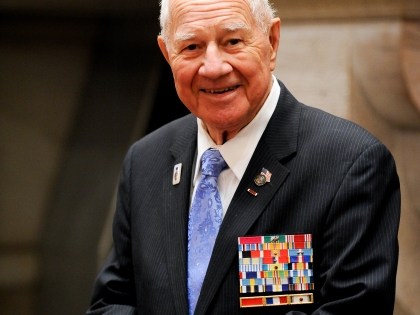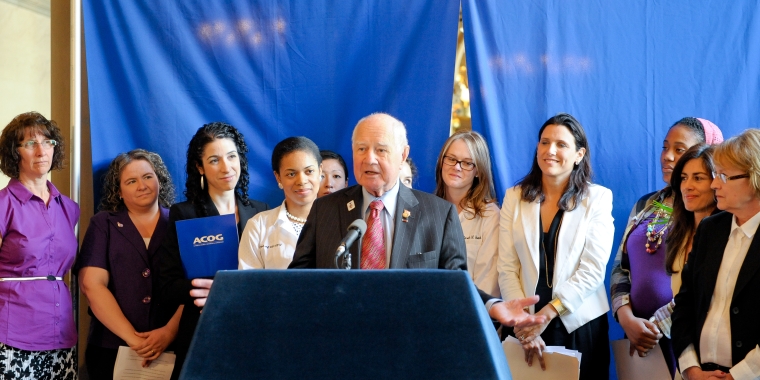
Statement From Senator Bill Larkin
William J. Larkin Jr.
June 12, 2009
On The New Bipartisan Senate Majority Coalition
On Monday, I supported the creation of a new bipartisan coalition to lead our State into a new era.
In a matter of minutes after its creation, the Senate’s bipartisan coalition was able to adopt historic new rules and reforms. Among these were term limits for leaders, making committee membership proportional to membership in the Senate as a whole, public voting records, and statewide broadcasts of legislative proceedings.
It was necessary for the Senate to work in a bipartisan manner to alter the destructive course New York was imparting on. I am reaching out to all my Senate colleagues to join our bipartisan coalition so we may end gridlock in Albany and get back to doing the work our constituents elected us to do.
-30-
Summary of Rules Changes
Temporary President
• The Temporary President of the Senate presides in the absence of the Lieutenant Governor. He is subject to a term limit of 6 years.
• Appoints the Vice President of Urban Policy and Planning.
• Appoints officers and employees of the Senate, subject to the disapproval of the Vice President Pro Tempore and Majority Leader (VPPT). Appoints Vice Chair of Rules.
• Appoints the Legislative Librarian.
• Represents the Senate in any legal action.
• Ensures the use of electronic media to provide access to Senate documents and proceedings.
• Jointly, with the VPPT, appoints the chairs of all standing committees and commissions and the members of all committees and commissions.
• Jointly, with the VPPT, designates appointments to all boards, commissions, task forces, etc. to which the Temporary President has appointing authority.
Vice President Pro Tempore and Majority Leader
• If the TP does not preside, the VPPT is the presiding officer, or may designate another to serve for him. Also subject to a 6 year term limit.
• Chairs the Rules Committee, or may designate another as Chair.
• Appoints Senate Leadership positions, and jointly appoints the membership to committees.
• Coordinates Majority conference and all functions and operations of the Senate.
• Appoints officers and employees of the Senate, subject to the disapproval of the TP.
• Exercises general control over Senate property, in consultation with the TP.
• Designates persons with access to the floor, jointly with the TP.
Rules Reforms
• The Senate shall be administered in a fair, equitable and nonpartisan manner.
• Committee Chairs and Rankers are term-limited to 8 years.
• Committee membership will be proportional to membership in the Senate as a whole. Minority representation shall not be less than 33% on any committee. (Eff. 7/15/09).
• Proxy voting in committee is eliminated.
• Eliminates “aye without recommendation” members must either vote nay or aye on a bill, unless they abstain due to a pecuniary interest.
• All agendas and voting records will be published on the Senate Website; all committee meetings recorded and webcast. A plan will be put forward by January 1, 2010 to create NY-SPAN statewide broadcast of legislative proceedings similar to C-SPAN for Congress.
• No bill may be introduced without a named Senate sponsor.
Administrative Reforms
• All members will have access to the resources and services of the Senate: supplies, print and media production, administrative services, and mailing.
• District office allocations are based on the geographic area; larger districts will be allowed a satellite office(s) to meet the needs of their constituents.
• All members will receive the same base allocation for staffing.
• Committees and Leadership will receive an allocation for staffing pursuant to a resolution which will detail the amounts allocated for each committee or position. Amounts shall be proportional among majority and minority members to representation in the Senate as a whole, but in no event shall it be less than 33% for the Minority.
• Central Staff funding shall be allocated on a proportional basis, but in no event less than 33% of the funds shall be allocated to the minority. Staff necessary to the functions of the Senate are not to be included in the proportional distribution.
• Member items will be divided evenly.
Procedural Reforms
• A non-sponsor amendment if successful will retain its place on the calendar for three days and then shall be taken up by the body for final passage, not returned to committee.
• Messages of Necessity shall only be permitted in cases of actual emergencies.
• A new motion for consideration is created. A sponsor may move to have his or her bill included on the next active list if a majority of members present and voting agree to the motion.
• A petition for consideration is also created, which allows a majority of the members elected to request a bill be put to the floor. If successful, the bill shall be placed on the active list for the next session day. If within the last four days of session, it shall be immediately considered by the body if successful.
• All procedural votes require only a majority of members present and voting, rather than members elected.
• Debate may exceed 4 hours on budget bills, any bill considered pursuant to a message of necessity, or those which appropriate money.
Share this Article or Press Release
Newsroom
Go to Newsroom70th Anniversary of D-Day
June 6, 2014



